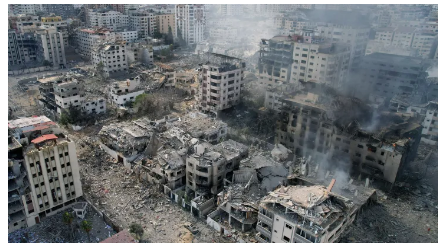War is something Israel is familiar with, having had 18 wars in its short 70-year history. However, the Israel-Hamas war is something of a peculiar nature, in which there is no identifiable “good guy”. In the Israel-Hamas war, both sides are guilty of committing heinous acts, but the only situation in which a resolution can occur is with diplomacy by neighboring countries, to help foster a better future for both sides in the conflict
To better understand Hamas’s attack on Israel, it is vital to delve into the background of the conflict. The land beneath Israel is widely known as Palestine and it is believed to be the birthplace of Christianity and Judaism. Palestine was occupied by the Israelis during the 3rd century BCE, until it was taken over by the Roman Empire, leading to a Jewish diaspora (scattering of people from their homeland) into Europe, Asia, and Africa. From then until the early 19th century, this region was passed around from empire to empire, but the people inside managed to form their own identity as Palestinian Arabs. During World War 1, Britain conquered the region, and when WWI concluded, Britain gave it to Jews to create the State of Israel, despite Jews being a small minority within the region. This caused an outcry from the Palestinians who believed it to be their land. Over 700,000 Palestinians were forced out of the land that was historically theirs. Then, after WWII, the concept of Jews returning to their homeland became prominent again through Zionism, an initiative that stated Jews should return to their holy land of Palestine, to escape antisemitism within Europe. This led to over 850,000 Jews moving into Israel, many of whom were granted legal privileges from other countries, as these countries felt indebted to Jews.
When the Palestinian political/terrorist group Hamas (also known as the Islamic Resistance Movement), was elected in 2006, their control was only the Gaza Strip (southeast of Palestine) and the West Bank (northwest of Palestine). Since 2021, Hamas has been quiet, with seemingly no threat to the Israeli government. On Oct 7, 2023, however, Hamas launched over 5,000 missiles at Israeli territory and 2,500 soldiers on the ground into Israel. Mohammad Deif called for “Muslims everywhere to launch an attack” and to “kill [Israelis] wherever you can find them”. Part of Hamas’s war strategy was to make their attacks prominent on social media, and they posted hundreds of videos of the torture and killing of citizens, as well as of 200 captured hostages to use as leverage against Israel and to instill fear in their citizens. They also used the spread of misinformation to sway other countries into siding with them. Although Hamas’s attack was tragic and unjustified for many, for many, it was nothing but a retaliation for Israel taking their homeland without regard to the culture and history that they have developed there.
Israelis assert an ancestral connection to the land predating any Palestinian country, while Palestinians maintain that they share a longer historical and cultural attachment to the land. Many people see Hamas as solely responsible for the conflict, but Israel’s retaliation is what makes it difficult to see who is in the right. Leaders across the world have called for no response from Israel, but instead, they have declared a readiness for war. The Gaza Strip is an extremely impoverished region, and around 50% of its population is under 18. It has a population density that is very similar to Boston (13,900 per sq/mi), and its capital Gaza City has a population density greater than both London (14,500 per sq/mi) and New York City (29,302 per sq/mi). Defense Minister Yoav Gallant said that Hamas had “made a grave mistake” and that “Israel will win”. Shortly after, Israel launched a series of missile barrages into the Gaza Strip, which killed 8,300 people, 3,500 of whom were minors. Over 1.1 million people have been left homeless from Israel’s retaliation, most of whom were innocent civilians. Israel has also begun to threaten the targeting of hospitals. The Israeli military ordered 2 hospitals in the Gaza Strip to be evacuated, which means that they are likely a threat for bombing in the near future. These two hospitals, however, are not able to evacuate because of the thousands who are sheltered there from injuries, and the hundreds who are immobile on life support. The World Health Organization has said that if Israel were to go through with the bombing, it would kill over 14,000 people and would be deemed illegal. Even though Hamas’s attack caused significant damage, the retaliation from Israel has achieved nothing except for killing, injuring, and leaving millions of innocent Palestinians homeless.
In an ideal world, Palestinians and Jews could form a joint country in which they could live peacefully on their current land. Still, because of their previously shared tensions, especially with the difference in religion, this could never become a viable option. Many Pro-Palestinian groups are pressuring Israel to relinquish its land to who they believe is the rightful owner, Palestine. However, for Israel to give up their entire country is an impossible task, and will never happen without violent intervention from another country. With those two solutions out of the picture, many believe that an external country should intervene, so that Palestine and Israel can coexist as they did years before, but Hamas’s goal is to resist Israel, which is made clear by their name (Israel Resistance Movement). If Hamas maintains leadership in the Gaza Strip, there is no possibility that these countries can coexist as neighbors. One of the viable situations where peace can be found in the Palestine region is if Israel gives a part of Palestinian land to Hamas, similar to what is going on currently. Unlike how it is now, for this solution to be viable, it would need intervention from other neighboring countries to make Israel give up the land. Similar to South and North Korea, I think a demilitarized zone (or DMZ) can play a huge part in keeping these countries separate and out of violent affairs, which is normally difficult for countries that share a border. Because of the deep-rooted history between Israel and Palestine, the international community must seek to intervene to solve the issues in the Israel-Hamas war before the death toll rises too high.
The only situation in which the Israel-Hamas war can be solved is through the joint diplomacy of both international countries as well as regional countries to mediate land exchange, however, this path is elusive and subject to change over time. The suffering and violence in both countries highlight the urgency for a solution. Israel and Hamas have both already committed many heinous killings, but for these countries to foster a better future for the newer generations, they must work diplomatically to find a solution that gives justice to the Palestinian’s history in Palestine, as well as gives justice to Israel’s historical right to the land.











